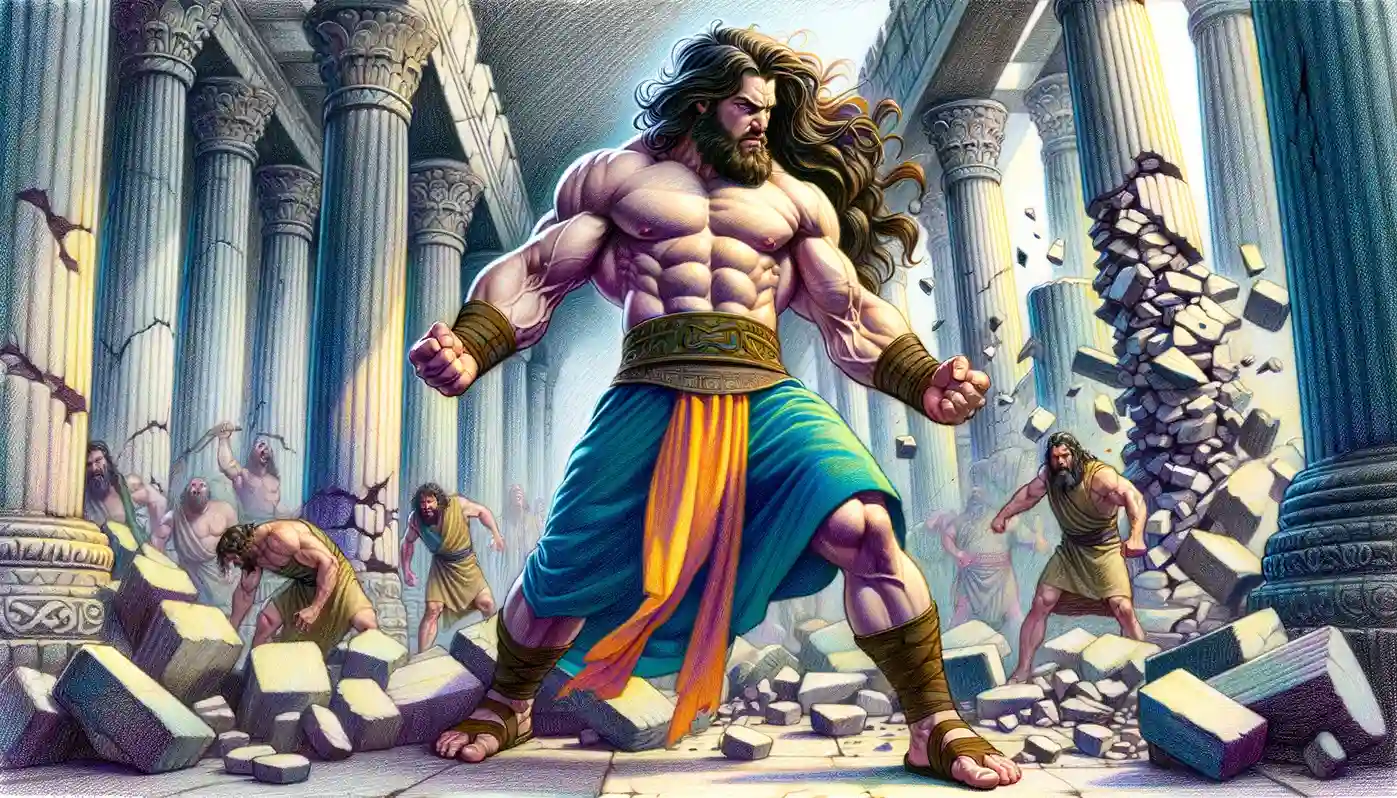
Samson: Judge of Israel, Known for his Incredible Strength
Samson, one of the Judges of Israel, is renowned for his incredible physical strength, which he derived from his Nazirite vow to God. His story, recorded in the Book of Judges, highlights themes of divine empowerment, human weakness, and redemption.
Quick Facts
- Judge of Israel: Samson served as a Judge of Israel for 20 years.
- Nazirite Vow: His strength was linked to his Nazirite vow, which included not cutting his hair.
- Incredible Strength: Samson performed feats of immense strength, such as killing a lion with his bare hands and slaying a thousand Philistines with a donkey’s jawbone.
- Conflict with Philistines: He waged a personal and public conflict against the Philistines, who were oppressing Israel.
- Delilah’s Betrayal: His lover, Delilah, betrayed him by discovering the secret of his strength and cutting his hair.
- Imprisonment and Death: Blinded and imprisoned by the Philistines, Samson’s strength returned, allowing him to bring down the temple of Dagon, killing himself and many Philistines.
- Symbol of Redemption: Despite his flaws, Samson’s final act was seen as a redemption and fulfillment of his mission against the Philistines.
- Mentioned in Hebrews: Samson is listed among the faithful in Hebrews 11:32.
Nazirite Vow and Birth
Samson’s birth was foretold by an angel to his parents, who were childless. The angel instructed them to dedicate Samson as a Nazirite from birth, meaning he would abstain from wine, avoid contact with the dead, and never cut his hair (Judges 13:1-5). This vow was the source of his supernatural strength.
Feats of Strength
Samson’s life was marked by extraordinary feats of strength. Some of his notable acts include:
- Killing a Lion: On his way to Timnah, Samson killed a lion with his bare hands (Judges 14:5-6).
- Slaying Philistines: He killed thirty Philistines to settle a bet (Judges 14:19) and later killed a thousand with the jawbone of a donkey (Judges 15:15).
- Carrying the Gates of Gaza: In a display of his strength, Samson carried the gates of Gaza to the top of a hill (Judges 16:3).
Conflict with the Philistines
Samson’s conflicts with the Philistines were both personal and national. His marriage to a Philistine woman led to a cycle of revenge and violence between him and the Philistines. Despite his personal failings, Samson’s actions were part of God’s plan to deliver Israel from Philistine oppression.
Delilah’s Betrayal
Samson fell in love with Delilah, a woman from the Valley of Sorek. The Philistine leaders bribed her to discover the secret of his strength. After several unsuccessful attempts, Samson finally revealed that his strength was in his uncut hair. Delilah cut his hair while he slept, leading to his capture by the Philistines (Judges 16:4-21).
Imprisonment and Death
Blinded and imprisoned, Samson was brought to the temple of Dagon to entertain the Philistines. In his final act, he prayed to God for strength one last time. Placing his hands on the temple pillars, he pushed them down, collapsing the temple and killing himself along with many Philistines (Judges 16:28-30). This act of destruction was a significant blow to the Philistines and a fulfillment of his role as a Judge of Israel.
Theological Themes
- Divine Empowerment: Samson’s strength was a gift from God, emphasizing that true power comes from divine sources.
- Human Weakness: Despite his physical strength, Samson’s story is also a cautionary tale about personal weakness and moral failure.
- Redemption and Sacrifice: His final act is seen as a redemptive sacrifice, fulfilling his mission to challenge the Philistines.
Mention in Hebrews
Samson is mentioned in the New Testament book of Hebrews as part of the “hall of faith,” recognizing his faith and role in God’s plan despite his flaws (Hebrews 11:32).
Legacy and Impact
Samson’s story has had a lasting impact on religious thought and popular culture. His life illustrates the complexities of human character, the consequences of personal choices, and the possibilities of redemption through faith and divine intervention.
Conclusion
Samson, a Judge of Israel known for his incredible strength linked to his Nazirite vow, waged a relentless conflict against the Philistines. Despite his personal failings and betrayal by Delilah, his final act of strength and sacrifice brought significant destruction to the Philistines, highlighting themes of divine empowerment, human weakness, and redemption.

